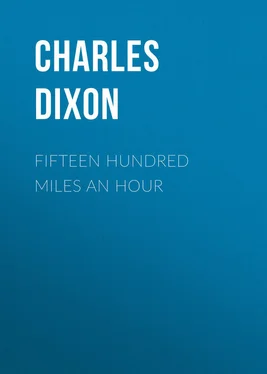Charles Dixon - Fifteen Hundred Miles An Hour
Здесь есть возможность читать онлайн «Charles Dixon - Fifteen Hundred Miles An Hour» — ознакомительный отрывок электронной книги совершенно бесплатно, а после прочтения отрывка купить полную версию. В некоторых случаях можно слушать аудио, скачать через торрент в формате fb2 и присутствует краткое содержание. Жанр: foreign_antique, foreign_prose, на английском языке. Описание произведения, (предисловие) а так же отзывы посетителей доступны на портале библиотеки ЛибКат.
- Название:Fifteen Hundred Miles An Hour
- Автор:
- Жанр:
- Год:неизвестен
- ISBN:нет данных
- Рейтинг книги:4 / 5. Голосов: 1
-
Избранное:Добавить в избранное
- Отзывы:
-
Ваша оценка:
- 80
- 1
- 2
- 3
- 4
- 5
Fifteen Hundred Miles An Hour: краткое содержание, описание и аннотация
Предлагаем к чтению аннотацию, описание, краткое содержание или предисловие (зависит от того, что написал сам автор книги «Fifteen Hundred Miles An Hour»). Если вы не нашли необходимую информацию о книге — напишите в комментариях, мы постараемся отыскать её.
Fifteen Hundred Miles An Hour — читать онлайн ознакомительный отрывок
Ниже представлен текст книги, разбитый по страницам. Система сохранения места последней прочитанной страницы, позволяет с удобством читать онлайн бесплатно книгу «Fifteen Hundred Miles An Hour», без необходимости каждый раз заново искать на чём Вы остановились. Поставьте закладку, и сможете в любой момент перейти на страницу, на которой закончили чтение.
Интервал:
Закладка:
"Then all I can say is that your ethics are not mine, that your theology is not half the comfort or support to you in your extremity that my philosophy is to me in mine," remarked the Doctor.
"Once more," said the Doctor, "let me bid you wait. Let the motors be started again, Graham, at full pressure. Some unforeseen occurrence may yet work our salvation."
As time went on, Graham and Temple became more resigned to their fate; and, in answer to the Doctor's urgent entreaties, gave him their promise to think no more of suicide, at least until matters became more desperate. The Doctor never abandoned hope. Calmly he bore up under all difficulties, plodding along with his instruments and his calculations; writing up his journals, and making voluminous notes, though every word he penned was probably never destined to be read by any other mortal but himself.
During the twentieth month of our absence from Earth, vast clouds of meteorolites passed within a few miles of us; and at one time the whole range of our vision was filled with these brilliant objects, just like a snowstorm of sparkling fire. Many small ones struck the Sirius , others exploded close by with sharp reports. We were too much alarmed and too disconsolate thoroughly to enjoy the glorious sight, the effects being beautiful in the extreme, and we were thankful when we passed beyond this shower of fire.
Onwards, onwards and onwards we sped, falling with awful velocity through space. So fast did we travel that our indicators failed to record the rate of speed, but still the sun did not appear any closer.
This was our one assuring hope. The Doctor was assiduous in his observations, but could not arrive at any definite conclusion. A week before our second Christmas in the Sirius , after a careful scrutiny through his largest telescope, he joyfully announced that Mars was greatly increasing in apparent size, and that he had actually detected the presence of two satellites revolving round the planet! Here was welcome news, indeed! If this were true, then, after all, we had nothing to fear from the sun. After some further investigation we were thoroughly convinced of our safety. No words can tell our feelings of thankfulness. We felt as though we had been snatched from the very jaws of death.
"I can only explain our apparent fall towards the sun," said the Doctor, "by the extreme rarity of the ether around us. This was not sufficient to float us, nor to afford resistance to our motors: hence we fell into space, instead of being propelled through it. I made the very natural error of supposing that some attractive force was at work, other than that exerted by the planet Mars. Once more our prospect is unclouded. The worst part of the journey is over; we may expect at any time now to find our centre of gravity fixed on Mars, at last – then success may almost be counted upon as a certainty."
Our second Christmas in the Sirius was spent as happily as the first. The past year had been an exciting and eventful one for us; full of dangers, full of trials; and three of our party felt that we had overcome them, thanks in a great measure to Doctor Hermann's skill and indomitable courage.
Almost daily we found the ether around us becoming more dense, and the speed of the Sirius sensibly decreased. Our water supply once more became plentiful, the condensers now working admirably.
We kept New Year's Day as a great holiday – a red-letter day in our experience, each of us feeling that we ought to inaugurate such an eventful year in not only our own history, but that of mankind, in a manner suited to its vast importance. As the clocks on Earth were striking midnight on the 31st of December, 1876, and New Year's greetings were being exchanged in all parts of the world we had left, four human beings, millions of miles away in space, were doing likewise. Earth shone steadily, like a pale beautiful star, below us. During the first few moments of that glad New Year, we drank with mild and boisterous enthusiasm to the planet Mars, to the men on Earth, and to our own success.
Owing to the increased rate of speed at which we had been travelling, our distance from the Earth had increased much more than we had suspected. The Doctor computed our distance from Earth to be now 28,000,000 miles! If all went well, we should arrive at Mars in about six months' time. We all of us had long felt weary of our close confinement. Owing to the strict rules of hygiene that the Doctor enforced, not one of the party had suffered from disease. Still, it was a great joy to know that we should soon be released from the Sirius , and the wonders of a new world were a rich reward in store.
Mars, now, was a most beautiful object in the heavens. Long and often did we peer at it through our telescopes in wondering astonishment, as it shone in brilliant ruddy glory, still millions of miles away. The Doctor was enchanted with his discovery of the satellites of Mars.
By the end of January, 1877, we had crossed those regions of rarefied ether, which were little more than an absolute vacuum; and the Sirius was once again propelled by its motive forces alone.
We now thought it advisable slightly to check our engines, and our speed was reduced to about twelve hundred miles per hour. Another interesting phenomenon was the change in our centre of gravity, which was now the planet of Mars. This last great discovery set all our doubts at rest. Between five and six millions of miles had still to be traversed, many perils had still to be undergone, many difficulties remained to be overcome – but Mars, bright, glorious, ruddy Mars, was conquered at last!
CHAPTER V.
THE GLORIES OF THE HEAVENS
For a month after the last events were chronicled the Sirius pursued its way steadily towards Mars, without a single exceptional incident. On the second of February, however, when we were about four and a quarter millions of miles from our destination, we were dreadfully alarmed by a series of majestic natural phenomena.
On the evening of the day just mentioned, or, rather, what would have been evening could we have distinguished night from day, the sun, for the first time since we left the shadow of Earth, began to shine less brightly. As the hours went by he became more and more indistinct, just as he appears through a fog on earth, and finally his fiery rays were hidden behind vast banks of cloud. The blazing light now became a depressing gloom, just as before a thunderstorm. Our dog evidently felt ill at ease, and whined and trembled as with great fear.
Rapidly the gloom increased. Darker and darker grew the fathomless void which we were crossing, until we were surrounded by one vast blackness, such as no dweller on Earth could ever conceive. The Sirius was lighted with incandescent lamps, but these only served to make the awful darkness more profound. This terror-inspiring gloom seemed to enter our very souls; we could not only see it, we could absolutely feel it. The Sun seemed as though he had finally burnt himself out, and disappeared for ever from the spangled firmament, leaving all within the focus of his once-glorious rays in unutterable chaotic blackness. It was as though we had penetrated into the very womb of the universe, where no light could ever be!
"I think this is absolutely the most dreadful of our many weird experiences," said Temple to the Doctor.
"It is sublimely grand," answered the Doctor, "and only shows how infinitely little man knows of the forces of Nature away from his own planet."
"Doctor, there is something wrong with our compasses. The needles are revolving with great velocity. I trust the presence of all this electricity round us will not injure any" —
Before Graham could finish, the whole firmament seemed lit up with a dazzling purple light, and a moment afterwards we were struck dumb with horror at the awful sound which followed it. For a moment the Sirius seemed about to fall to pieces; every bolt and plate in her vibrated, and we gave ourselves up for lost. The frightful explosion was like nothing heard on Earth: ten thousand thunder-claps in one would be but a feeble imitation of that terrible discharge, which was gone in a moment without a single echo to mark its departure!
Читать дальшеИнтервал:
Закладка:
Похожие книги на «Fifteen Hundred Miles An Hour»
Представляем Вашему вниманию похожие книги на «Fifteen Hundred Miles An Hour» списком для выбора. Мы отобрали схожую по названию и смыслу литературу в надежде предоставить читателям больше вариантов отыскать новые, интересные, ещё непрочитанные произведения.
Обсуждение, отзывы о книге «Fifteen Hundred Miles An Hour» и просто собственные мнения читателей. Оставьте ваши комментарии, напишите, что Вы думаете о произведении, его смысле или главных героях. Укажите что конкретно понравилось, а что нет, и почему Вы так считаете.












